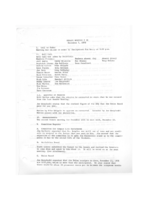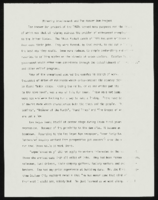Search the Special Collections and Archives Portal
Search Results

Meeting minutes for Consolidated Student Senate, University of Nevada, Las Vegas, December 7, 1976
Date
Archival Collection
Description
Text

"Minority Involvement and the Hoover Dam Project": manuscript draft by Roosevelt Fitzgerald
Date
Archival Collection
Description
From the Roosevelt Fitzgerald Professional Papers (MS-01082) -- Unpublished manuscripts file.
Text
Duy Ngyuen (Asian Community Development Council) oral history interview conducted by Magdalena Martinez: transcript
Date
Archival Collection
Description
From the Lincy Institute "Perspectives from the COVID-19 Pandemic" Oral History Project (MS-01178) -- Community organization interviews file.
Text
Kellie Kowal-Paul (Clark County School District) oral history interview conducted by Magdalena Martinez and Elia Del Carmen Solano-Patricio: transcript
Date
Archival Collection
Description
From the Lincy Institute "Perspectives from the COVID-19 Pandemic" Oral History Project (MS-01178) -- Education sector interviews file.
Text

Transcript of interview with Sandra Peña by Lada Mead and Stefani Evans, March 27, 2017
Date
Archival Collection
Description
Sandra Peña’s story begins in East Los Angeles, where she spent her first fifteen years with her parents (both from Michoacán, Mexico), and her younger sister. The father's managerial position at Master Products allowed the family to live rent-free in a company-owned house behind the main factory, because he collected the rents for the company's two other dwellings. In this interview, Peña recalls the family move to Porterville, in California's Central Valley, her return to Los Angeles at nineteen, and her work with Parson’s Dillingham, a contractor for the Metrolink rail system. She draws the link between the Los Angeles and Las Vegas construction communities by describing her husband's move to Las Vegas to find work; a chance Las Vegas encounter with a friend from Chino, California; her ability to gain employment in Las Vegas at Parson’s, a company that had joint ventured with Parson’s Dillingham, and her move from there to Richardson Construction, a local minority-owned company. As Peña says, "It's kind of all intermingled. Even if you go here and you go there, it's like everybody knows everybody." Throughout, Peña weaves her family story into the narrative as she describes her youth, the birth of her son, the illness and death of her father, and her family's participation in her current employment with Richardson. As she remembers the people, places, and events of her life, Peña speaks to the ways one woman of color built on her interstate construction connections and rose in a male-dominated industry.
Text

Jessica Hutchings oral history interview: transcript
Date
Archival Collection
Description
Oral history interview with Jessica Hutchings conducted by Barbara Tabach on March 21, 2018 for the Remembering 1 October Oral History Project. In this interview, Jessica Hutchings discusses her experience flying to Las Vegas, Nevada on the night of the October 1, 2017 mass shooting. She speaks of her flight's detour to Phoenix, Arizona, and her discovery of the shooting. Hutchings explains how Congregation Ner Tamid, where she is a cantor, contributed to the community healing after the tragedy, including their organization of vigils, a music fundraiser called "Vegas Strong in Song," and discussing the event with teenage Hebrew School students who had questions and concerns about the shooting.
Text
Marie and James B. McMillan Photograph Collection
Identifier
Abstract
The Marie and James B. McMillan Photograph Collection (1900-1994) contains photographs of Marie and James B. McMillan and their families. The collection also includes photographs of their friends and professional associates, including journalist Hank Greenspun, Nevada civil rights pioneer J. David Hoggard, and entertainer Sammy Davis Jr. Marie McMillan is a former Las Vegas, Nevada flight instructor and one of the first women to work at the Nevada Test Site in Nye County, Nevada. James B. McMillan was the first African-American dentist to practice in Nevada, as well as a prominent Nevada civil rights leader.
Archival Collection
John Klai II Papers
Identifier
Abstract
The John Klai II Papers (1983-2024) is comprised of the personal papers of American architect, John Klai II. Materials include commendations presented to Klai for his achievements in the architecture and interior design profession from organizations like AIA Las Vegas; the National Council of Architectural Registration Boards (NCARB); and the Nevada State Board of Architecture, Interior Design and Residential Design. The collection also includes digital images of plaques and trophies presented to Klai for his philanthrophic work in the Las Vegas community. The professional files in this collection include publications featuring the work of Klai Juba Wald architecture + interiors, Klai's 2015 AIA Fellowship submission portfolio, magazine features about Klai, and a commemorative photo book of Klai Hall at North Dakota State University. Also included are a small number of Klai's personal sports memorabilia, including tickets for the NCAA men's basketball tournaments from 1987 and 1989.
Archival Collection
Chabad of Green Valley
Rabbi Mendy Harlig and Rebbetzin Chaya Harlig established Chabad of Green Valley/Henderson out of their home in 1998, where they offered religious services, holiday celebrations and classes to the local Jewish community. In 2002, they moved into the Eastern Ave storefront, enabling the center to enhance its existing services and expand into a wider variety of programs benefiting the community. Chabad of Green Valley/Henderson has recently had a groundbreaking on the site of their new property, located on Carnegie St. between Kenneth Ave.
